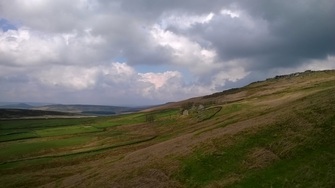 The climate is constantly changing on the moors
The climate is constantly changing on the moors I’ve already turned up the heat on Annecdotal, with my previous post on the novel, Instructions for a Heatwave. I’d been going to save it for a sultry summer’s day – should we get one this year – but Charli’s prompt makes it equally topical as we come to the end of a showery April. What I recall of the summer of 1976 is how unprepared we were for the heat here in Britain. How we must’ve sweated in our heavy nylon clothes as we endeavoured to keep up our cold-climate routines. Just as Gretta in Maggie Farrell’s novel continues to bake her own bread in inflated temperatures, I have a vivid memory of how, the heat already unbearable, my ironing just had to be done.
We seem equally unprepared for the floods that now beset our shores with alarming regularity. I’m not sure exactly when I read The Flood by Maggie Gee – but given that it was published in 2004, it can’t be that long ago – but, since then, events that seemed exaggerated in the novel have been played out again and again on the evening news: stinking streets; stranded cattle; ordinary people going about their business by boat. The privileged are determined to continue as normal in Maggie Gee’s apocalyptic London: the infrastructure may be crumbling, people may be homeless and the rain interminable, but President Bliss directs his energies into wooing celebrities at an evening “do”.
These were the literary influences of which I was consciously aware when I came to tackle the 99-word challenge. Maybe it’s practice, maybe it’s the topic, but I found this a little easier than the last one on memoir.
When they began rationing the water, George thought he’d be immune. His daughters would bring plastic bottles of Mountain Spring the minute the floods receded and the roads were passable again. Meanwhile, Matron harvested rainwater, which tasted foul, no matter how diligently it was filtered and boiled.
Wilting in the heat, battling cholera and dysentery, the old folks felt forgotten, until the Press paddled a rubber dinghy to Shady Glen. Cameras clicked as George was pushed to the front. How do you feel now, Mr Bush? Don’t you wish you’d acted on global warming when you had the chance?
If you’re thinking of joining in, and I highly recommend that you do, check out Charli’s guidelines for yourself as I think I may have taken a slightly different approach in writing a story on the topic of climate change rather than a story in which the climate changes. Subtle difference?
I look forward to your feedback.





















 RSS Feed
RSS Feed





















